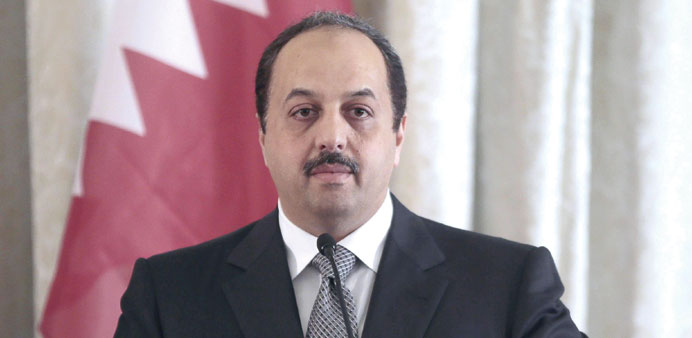AFP/Paris
|
|
Qatar yesterday renewed its call for international intervention in Syria “to protect its people from what they are being subjected to”.
HE the Foreign Minister Dr Khalid bin Mohamed al-Attiyah said the chemical attacks on August 21 saw the regime of Bashar al-Assad move from conventional warfare to “weapons of mass destruction”.
“If the international community really wants to protect international peace and security, it cannot afford to stand still while unarmed people are being attacked with these weapons,” he told a press conference after holding talks with US Secretary of State John Kerry as part of an Arab League ministerial team.
“We in Qatar support the statement of the 12 out of the G20,” al-Attiyah said. “We call on other countries to intervene to protect the Syrian people from what they are being subjected to.”
Asked about whether Qatar would directly contribute to military action in Syria, he said: “Qatar is currently studying with its friends and the United Nations what it could provide in order to protect the Syrian people.”
Kerry said that Arab League ministers had agreed at talks in Paris that Syria had crossed a “global red line” in its chemical weapons attack.
Kerry said a number of Arab countries were willing to sign a statement agreed by 12 countries of the G20 that called for a reaction to the alleged attack, and that they would make announcements in the next 24 hours.
“All of us agree, not one dissenter, that Assad’s deplorable use of chemical weapons... crosses an international global red line,” Kerry told journalists after the talks.
“Today we discussed the possible and necessary measures that can be taken,” he said.
“A number of countries immediately signed on to the G20 agreement,” Kerry said, naming Saudi Arabia as among them.
“I am not going to name the other countries simply because we agreed in the meeting they would go back and make their own announcements, which they will do within the next 24 hours,” Kerry said.
“Everybody understood that the decisions need to be made within the next 24 hours.”
Kerry said that Saudi Foreign Minister Saud al-Faisal had made clear his country’s support for military action.
“They have supported the strike and they have supported taking action,” Kerry said.
Yesterday’s talks in Paris brought together officials from the Arab League, Bahrain, Egypt, Jordan, Kuwait, Morocco, the Palestinians, Qatar, the United Arab Emirates and Saudi Arabia.
With US lawmakers returning today from a summer break and set to debate whether to approve limited US military action in Syria, a crucial week looms for America with Barack Obama facing a defining moment in his two-term presidency.
Obama will blitz US networks today before addressing the American people from the Oval Office tomorrow aiming to lay out the case to deepen US involvement in a two-year-old war which has claimed over 100,000 lives.
The stakes are high, with Obama far from guaranteed of winning a green light from Congress, amid American fears of being dragged deeper into the conflict.
It remains unclear whether Obama would decide to go it alone if he fails to win congressional approval.
Assad yesterday warned that as Syria braced for military action, there could be a bitter consequences. “There’s no evidence that I used chemical weapons against my own people,” he reportedly told CBS television, in an interview to be aired today.
A top White House official said the Obama administration was planning “for every contingency” in case of any fallout from US military strikes.
“We have to obviously be very careful and very targeted and very limited in our engagement so we do not get dragged into the middle of this. And then there’s obviously risk of reaction and retaliation against our friends,” White House Chief of Staff Denis McDonough said on CNN.
The Los Angeles Times reported, meanwhile, that the Pentagon was preparing for three days of attacks on Syria, longer than originally planned.
War planners now aim to unleash a heavy barrage of missile strikes to be followed swiftly by additional attacks on targets that may have been missed or remain standing after the initial launch, the newspaper cited officials as saying.

